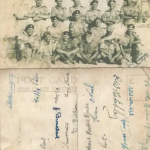Summary
After being captured in 1942 by the Germans in Libya, David Coster, a young Signalman, spent the remainder of World War II as a PoW, firstly in Italy and subsequently in East Germany. At the end of the war, having found his PoW camp in Germany abandoned by the guards, he walked out with others and made his way to American troops who assisted them in getting them home.
The full story follows, in two versions. The version in the first window below is the original scanned version of the story. In the second window below is the transcribed version in plain text.
[Digital Page 1]
DAVID CUSTER
PoW from June 1942 to May 1945
I was a Signalman in the Royal Corps of Signals attached to the 201 Guards Brigade serving in Libya. We were in a concentration of troops known as a Box. We were in the Knightsbridge Box in the Tobruk perimeter. The main troops were South African.
I can’t remember the exact date on which we were captured but it was in June 1942. I was in a slit trench in the morning having a shave, and there was a lot of gunfire around us. Another soldier who was also in the trench took a look over the top and said to me ” There’s a German tank going up like a firework display”. I took a look myself and not only was there this tank, but masses of them all around us. Then from a tank about a hundred yards away a German Officer got out and walked towards our Brigadier’s tent with a white flag, and I thought “Oh good they have given up!”. As he approached the tent however the Brigadier came out and took the flag off him and started waving it, and then I realised that it was we who had surrendered. My initial reaction was not one of fear, but strangely enough I found the situation quite amusing. I had always thought that I might be wounded or killed even, but it never occurred to me that I would become a Prisoner of War. The Germans did not want to deal with us after they had captured us and handed us over to their Italian allies, who shipped us over to Brindisi, and from there we were taken to a Transit camp in Benevento where we stayed for some three months. From Benevento we were sent on to Sulmona where we stayed until the Italians packed in. We were under the impression that the Germans were being chased out of Italy by our boys so we hid up in the mountains hoping to join our troops when they reached us. This was not the case. The Germans were conducting an orderly retreat, and had time to comb the mountains and take us with them to Germany.
Our time in Sulmona was spent trying to occupy ourselves as best as we could. We did not have to work, as we did subsequently in Germany. We had a football pitch and played inter-compound matches, inter-regimental matches and even International matches between England and Scotland.
[Digital Page 2]
There was also a theatre in one of the compounds and we used to put on plays, musicals and concerts. There were bands, including The Dance Band, The Mandoliers and an orchestra which played light music.
I took part in a couple of the concerts impersonating well known radio comedians of the day. I also took part in a Passion play directed by the Chaplain who was a Methodist. It was the Passion according to St Mark and I played the part of Mark himself. Mark was quite young in the time of Jesus and as I was only twenty when I was captured I was about the right age. The play consisted of short scenes, and in between them the curtains were closed and I carried on the narration of the texts.
One other activity I tried my hand at was shorthand. There was a chap in our compound who taught it, but I must say I didn’t get on too well with it.
The food in Sulmona consisted of either rice or macaroni in tomato puree with a bread roll, and twice a week a small portion of meat was added. The Red Cross supplied us with food parcels and without them I think we should have been pretty hungry most of the time. We also got cigarettes and tobacco through the Red Cross. Our next of kin were allowed to send us clothing parcels every three months and could enclose a bit of chocolate. I asked my father to send me a pipe, which he did and this was the first time I took to smoking. Even if there was no tobacco I could chew on the pipe if food was short.
The end of Sulmona came when the Germans decided to retreat from Italy and they took us to Germany in locked cattle trucks. The journey took five days and nights and in all that time we were let out only twice for ten minutes, one truck at a time. That for me was the worst part of all my three years as a PoW. I ended up in East Germany where I stayed until we were freed. We woke up one morning to find no guards and we were left to make our own way from there. We went westwards and met up with American troops who looked after us very well until sending us on our way home.



